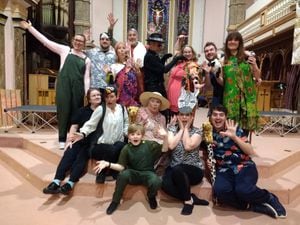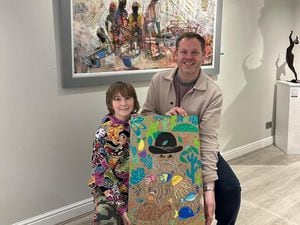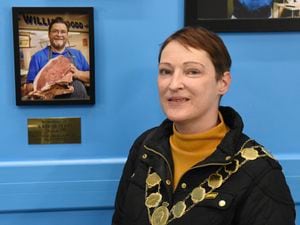Kirsty Bosley: It's funny, but I'm learning more skills than just how to be a comic
At university, groups and societies were all the rage. It's a human condition, wanting to be a part of something.

As a society we (largely) look upon one another for support and to get tasks completed.
I'm not sure why, but I've never been big on groups. I briefly joined the 'metal society' during my years of study but quickly realised that I garnered much more enjoyment standing in front of a band listening to metal than I did sitting around talking about it.

It all felt a little like forced friendship in that particular scenario. The group wasn't strengthened by it's numbers. It was the difference between two people sitting around drinking hot chocolate talking about Slayer's latest offering, and 10. Though I appreciate that for the lonely, it was a great way of spending time with others, I just didn't feel comfortable being pals with people for pals sake, on the strength of just one obvious thing in common.
So when I began a comedy course this week, I went with some trepidation. Under the guidance of super-hilarious comic actress and performer Janice Connolly, I'm hoping to learn the art of stand-up, alongside 13 other women with the same idea.
I wasn't concerned about the course itself as much as being thrust into a situation alongside strangers. I talk to people I've never met before all the time in my job, but always in short bursts and I can run away afterwards to my desk and not be disturbed. This course is 10 three-hour sessions, so there was definitely going to be more getting-to-know you than I was used to. I can't quite explain why, but I just didn't want people to get to know me for getting to know me's sake. I think perhaps it's a self-help group I need, rather than a comedy course. . .
Arriving at the arts centre, I made my way nervously to the room where our sessions would take place. I had no idea what to expect, what the ladies would be like or what we would be expected to do in the opening session. I also had a bit of a poorly cold, so I wasn't feeling in particularly good humour.
As more and more people filed into the room, I grew more and more nervous. Sitting in a circle with Janice, we began to introduce ourselves. The first woman in the circle gave her name and told us that she made meringues last night. The second introduced the first, told us that she'd made meringues, and then introduced herself in the same way. The third introduced the first two and herself and so on. I was fourth in the list and instantly consumed by terror. I wasn't going to remember the lady's meringues. And if I did, would I remember her name? Wait, what did that third woman say she did last night? Oh God. . .
My anxiety in itself was laughable. Once I'd successfully remembered the three people before me's evenings (one celebrated her husband's birthday, another tended to her sore throat), the pressure was off and I relaxed and took time to listen to the other nine women's evenings. The further round the circle we got, the more details everyone had to remember. When the tenth woman struggled to remember what my name was, Janice said simply: 'everyone help, this isn't a competition or a memory test'.
And that was the first big lesson that I learnt in our group. Take the pressure off.
More from Kirsty:
It'll be a sad day for the music world if artists are censored
Mum's mean actions are enough to leave me cold...
So many of us spend so much time worried about what we're doing and saying, that we perhaps don't take time to really listen. Not because we're self absorbed, but because we put unnecessary pressure on ourselves to get things right the first time.
Take the (brilliantly relevant) Twitter account Very British Problems for example. It highlights situations just like this. My favourites of all time include 'not catching someone's name meaning you can never speak to them again' and 'concentrating so hard on the appropriate eye-contact-to-looking-away ratio that you have no idea what's being said to you'.
Is this a British thing? Or a worldwide problem? And if this British problem is so widespread that more than one million people follow the feed on Facebook, then why is it still a problem? Can't we all just admit that we're socially awkward and get on with it? It's so strange.
Bit by bit, over the course of the session, Janice began to question how we were approaching things. There's no problem with asking someone's name if you didn't quite catch it the first or even second time, she reiterated. Don't pretend to know something if you don't know it, just ask. Similarly, don't assume that everyone knows everything that you're talking about. And that was another lesson that I learnt.
The more the session went on, the more skills I picked up. I thought we were just chatting, going around the room finding out about one another. And we were, but the lessons we were learning along the way, just from connecting with each other, were unprecedented.
For more information on upcoming events and attractions in the region click here
The purpose of comedy, I understand, is not to make yourself laugh, but to invoke that reaction in others. Therefore, what you say and think is not the most important thing – finding out how other people tick is crucial.
And if you can master the art of listening to people, paying attention to what they're saying and seeing things from their point of view, then it's not just your outlook on comedy that is enhanced.
I'm not saying that it's something you learn in one three-hour session in an arts centre, I'm not magically some amazingly mindful person as a result of listening to what baked goods a fellow group-member made last night.
But I do think that I completely underestimated the benefits of joining community groups and societies. I'm not sure how this will translate when it comes to our comedy showcase at the end of the course – will I be funny?
Either way, I'm not sure it matters (does it? Oh God am I going to be funny?) I went into this course with the intention to understand a different art form, and I've come away understanding more about myself.
I reckon that Janice is doing a stand-up job!





